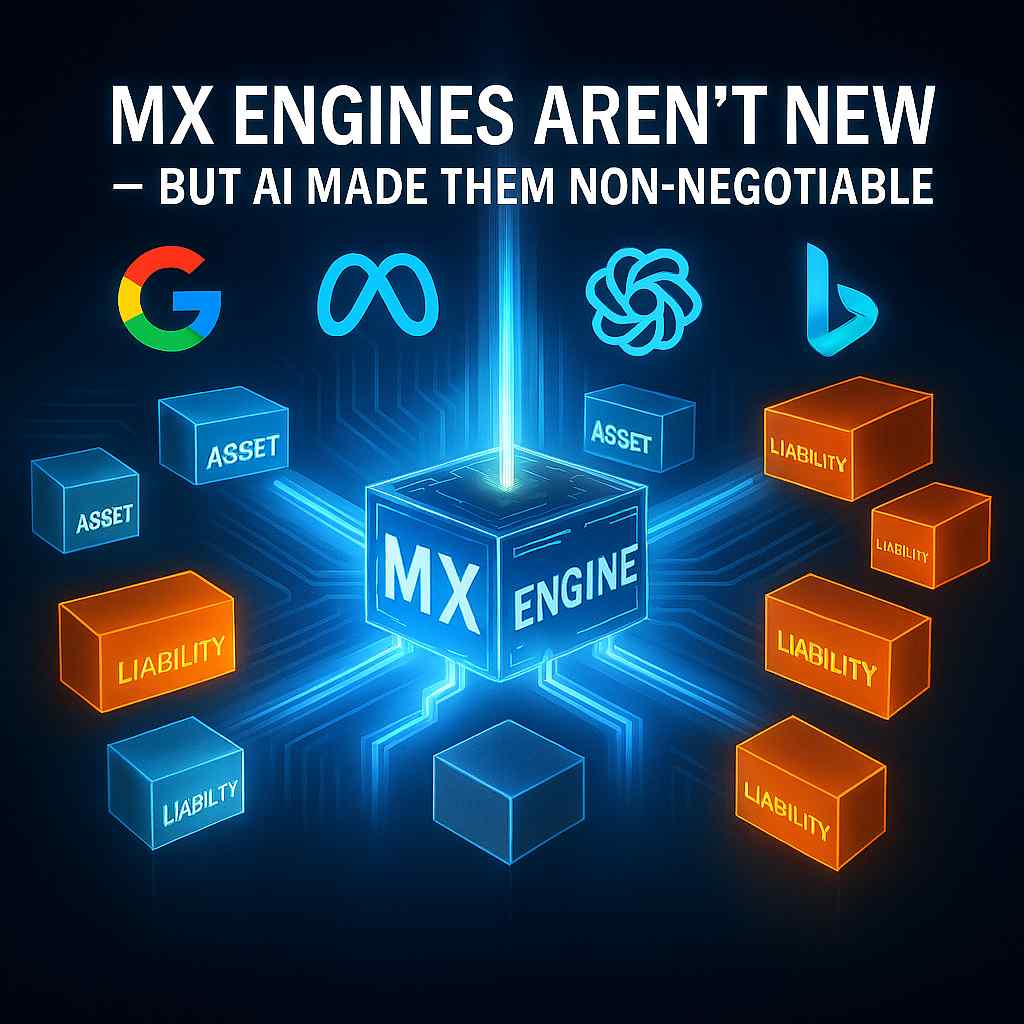MX Engines Aren’t New – But AI Made Them Non-Negotiable

The AI era hasn’t just arrived – it’s already gutted the top of the funnel.
AI Mode. Gemini. Perplexity. ChatGPT with browsing. Every one of them is designed to answer curiosity-led queries directly. They summarise, synthesise, and reroute user attention away from your domain.
If your strategy relies on long-tail informational traffic, you’re already being replaced.
The Real AI SEO Shift
Despite the noise, generative AI hasn’t replaced traditional ranking systems – it depends on them.
LLMs like GPT don’t magically know what the best commercial options are. They were designed to handle upper funnel prompts – and in that domain, they outperform traditional search. For learning, explanation, and information retrieval, they’ve made platforms like Stack Overflow and Wikipedia feel redundant.
However, when a user expresses high purchase intent, LLMs like Chat GPT will rely on the search engine Bing to retrieve trustworthy, ranked options.
Bing, like Google, runs on authority.
So no, LLMs haven’t replaced search engines. They have replaced informational clicks.
When it comes to the clicks that matter – the ones tied to value, competition, and decision-making – the system still relies on search engine, and search engines still rely on authority.
Which means SEO hasn’t gone away. It’s just been concentrated.
Your most valuable traffic still flows through Google and Bing. If you want to be included in the results they return – and in the listings that AI tools reference – you need your asset pages ranking in the top 10 for important transactional queries.
These queries are competitive, and where there’s competition, there’s a need for authority. If there’s a need for authority, then there needs to be an efficient authority delivery mechanism.
That’s where your MX Engine – your internal authority distribution system – comes into play, and determines the extent to which you survive or thrive.
What is an MX Engine?
Every website has one. Most don’t know it.
The Machine Experience (MX) Engine is the internal system that distributes authority throughout your site. Think of it as your site’s invisible equity routing infrastructure.
Most brands assume that when they build backlinks, the authority flows directly – and exclusively – to the landing page it points to. Like PPC budget, they expect 100% of the value to be spent on that target.
That is not how it works.
Authority gets redistributed – portioned out to other pages via internal links, with some being leaked to external pages. Without a system to manage that flow, most of that capital gets squandered.
Search engines crawl your site, follow links, and interpret structure. Where you place your internal links, how your navigation flows, and how your pages interconnect determines which pages grow in strength and which shrink into obscurity. That’s your MX Engine at work.
Authority enters your site via backlinks. This is your ranking fuel – or in Sovereign SEO terms, your ‘SEO Capital’. The MX Engine is the internal system that decides where that capital flows. Done well, it routes it to your asset pages – the ones that convert. Done poorly, it leaks into liability pages that dilute your performance.
If your authority isn’t flowing to asset pages, it’s not performing. If it’s not performing, it’s not compounding. And if it’s not compounding, it’s not a sustainable investment.
Top-of-Funnel Is a Trap
Faced with AI disruption, many SEO teams have responded in the only way they know how: publish more content. More blogs. More FAQs. More long-form guides.
The assumption? That AI Overviews are just the new featured snippet – and the answer is to flood the top of the funnel with keyword-dense content, hoping to get referenced by the LLM.
That thinking is everywhere. AIO. GEO. AI Mode Optimisation.
It’s repackaged content sprawl dressed up as strategy. It’s exactly what the charlatans want to sell – because it’s easy to produce, hard to measure, and sounds like innovation.
If you’re a blue-chip FMCG brand with budget to burn? Fine. Take a punt on being the tiny favicon in a curiosity-driven query. The risk-reward profile might make sense.
However, if budget constraints are a reality – or your business is reliant on organic traffic to drive performance – this approach is a disaster in waiting. You’re feeding liabilities and calling them assets. You’re burning capital that never had a chance to compound.
The fundamentals haven’t changed:
- Content without authority doesn’t rank.
- Rankings without click-throughs don’t drive traffic.
- Traffic without intent doesn’t convert.
- Content without a system doesn’t compound.
In the AI-first landscape, only bottom-of-funnel pages matter:
- Service pages
- Location pages
- Pricing and conversion pages
- Product comparisons
These are the pages that convert. These are the pages that still earn clicks. These are the pages users want. These are the pages AI tools surface when they defer to search engines.
If your MX Engine isn’t routing authority to these pages, your SEO is structurally broken. It doesn’t matter how good your content is. It won’t be seen.
Authority Is Your Only Lever
Top-of-funnel search traffic is gone. If it hasn’t already migrated to LLM tools like ChatGPT, it’s being swallowed by AI Mode.
You can’t fix this by publishing more content. Or tweaking titles. Or rewriting metadata. Or commissioning another EEAT audit.
You fix it by treating your website like an economy.
Every backlink is capital. Every internal link is a capital allocation decision. Every indexed page is either an asset or a liability.
The MX Engine is how you route capital to assets. It’s how you avoid bloat. It’s how you generate compound returns from the authority you already have.
It’s also how you get surfaced – whether by Google, Bing, or the LLMs that piggyback off them.
It’s Still an Authority Game. The MX Engine Just Became the Playbook.
Everyone else is trying to optimise for “AI” – without asking what that actually means.
For commercial SEO campaigns – campaigns that require ROI – optimising for AI means one of two things:
- Being cited by LLMs such as ChatGPT, which rely on traditional search engines to answer high-intent prompts
- Optimising against AI Mode, which replaces informational SERP listings with zero-click summaries that strip away visibility and traffic
The first relies on rankings. The second cannibalises them.
LLMs are users of the system. They piggyback off existing ranking infrastructure – and if you want to appear in their answers, you still need to rank in traditional SERPs.
AI Mode, by contrast, wipes out traditional discovery. It swallows top-of-funnel search and replaces it with answers. There’s no click, no conversion, no upside. Optimising for it means pouring capital into liability pages that never converted – and now don’t even get seen.
That’s not strategy. That’s capital destruction.
So no, you don’t optimise for AI. You optimise for the system that AI depends on – and you do it by ensuring your authority is channelled into pages that still hold value.
That’s what the MX Engine is built for.
It was always important. AI just made it non-negotiable.
This is what Sovereign SEO was built for.
Get in touch to see how a Sovereign SEO strategy can put your most important pages ahead of the competition.

Mike Simpson
With nearly 15 years of experience in SEO and digital marketing, Mike has built a reputation for driving growth and innovation. His journey began at Havas Media, where he developed expertise in client management, technical auditing, and strategic planning for top brands like Tesco Bank and Domino’s Pizza. He progressed to leading teams at Forward Internet Group and IPG Media-Brands, before taking on the role of Commercial Director & Chief Product Strategist at Barracuda Digital, where he delivered significant results for high-profile clients.
Now working as a consultant, Mike leverages his extensive experience to help businesses enhance their digital strategies, delivering bespoke solutions and measurable success. His strategic insights and dedication have made him a sought-after expert in the industry.